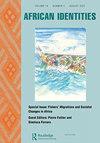Edwin Yingi, P. Hlungwani
{"title":"新冠肺炎疫情期间津巴布韦的选举民主和人权","authors":"Edwin Yingi, P. Hlungwani","doi":"10.1080/14725843.2023.2167805","DOIUrl":null,"url":null,"abstract":"The outbreak of COVID-19 ominously heralded a health crisis across the world. The World Health Organization (WHO) declared the virus a public health emergency in January 2020 and the world became concerned with the havoc the disease would potentially cause. Though the pandemic was a health crisis, it posed a lethal challenge to shaky contemporary democracies across the world. Governments, including that of Zimbabwe, responded to the pandemic by enacting sweeping stringent lockdown regulations to control the spread of the disease. The regulations curtailed freedom of mobility, regulated public gatherings, and suspended electoral processes. This article looks at how the pandemic has been used to limit citizens' civil liberties, erode the tenets of democracy, profoundly altered the pre-existing democratic trajectory, and entrenched the Zimbabwe state on the path of authoritarianism. Through a review of available secondary literature, the study systematically analysed the political developments as reported in electronic (including social media-twitter) and print media during the pandemic. The study established that the response by the Zimbabwe government to the COVID-19 pandemic compromised the security of persons, undermined democracy and electoral processes. The health crisis presented an opportunity for the consolidation of authoritarian rule. © 2023 Informa UK Limited, trading as Taylor & Francis Group.","PeriodicalId":35042,"journal":{"name":"African Identities","volume":" ","pages":""},"PeriodicalIF":0.0000,"publicationDate":"2023-01-25","publicationTypes":"Journal Article","fieldsOfStudy":null,"isOpenAccess":false,"openAccessPdf":"","citationCount":"0","resultStr":"{\"title\":\"Electoral democracy and human rights during the COVID-19 pandemic in Zimbabwe\",\"authors\":\"Edwin Yingi, P. Hlungwani\",\"doi\":\"10.1080/14725843.2023.2167805\",\"DOIUrl\":null,\"url\":null,\"abstract\":\"The outbreak of COVID-19 ominously heralded a health crisis across the world. The World Health Organization (WHO) declared the virus a public health emergency in January 2020 and the world became concerned with the havoc the disease would potentially cause. Though the pandemic was a health crisis, it posed a lethal challenge to shaky contemporary democracies across the world. Governments, including that of Zimbabwe, responded to the pandemic by enacting sweeping stringent lockdown regulations to control the spread of the disease. The regulations curtailed freedom of mobility, regulated public gatherings, and suspended electoral processes. This article looks at how the pandemic has been used to limit citizens' civil liberties, erode the tenets of democracy, profoundly altered the pre-existing democratic trajectory, and entrenched the Zimbabwe state on the path of authoritarianism. Through a review of available secondary literature, the study systematically analysed the political developments as reported in electronic (including social media-twitter) and print media during the pandemic. The study established that the response by the Zimbabwe government to the COVID-19 pandemic compromised the security of persons, undermined democracy and electoral processes. The health crisis presented an opportunity for the consolidation of authoritarian rule. © 2023 Informa UK Limited, trading as Taylor & Francis Group.\",\"PeriodicalId\":35042,\"journal\":{\"name\":\"African Identities\",\"volume\":\" \",\"pages\":\"\"},\"PeriodicalIF\":0.0000,\"publicationDate\":\"2023-01-25\",\"publicationTypes\":\"Journal Article\",\"fieldsOfStudy\":null,\"isOpenAccess\":false,\"openAccessPdf\":\"\",\"citationCount\":\"0\",\"resultStr\":null,\"platform\":\"Semanticscholar\",\"paperid\":null,\"PeriodicalName\":\"African Identities\",\"FirstCategoryId\":\"1085\",\"ListUrlMain\":\"https://doi.org/10.1080/14725843.2023.2167805\",\"RegionNum\":0,\"RegionCategory\":null,\"ArticlePicture\":[],\"TitleCN\":null,\"AbstractTextCN\":null,\"PMCID\":null,\"EPubDate\":\"\",\"PubModel\":\"\",\"JCR\":\"Q1\",\"JCRName\":\"Social Sciences\",\"Score\":null,\"Total\":0}","platform":"Semanticscholar","paperid":null,"PeriodicalName":"African Identities","FirstCategoryId":"1085","ListUrlMain":"https://doi.org/10.1080/14725843.2023.2167805","RegionNum":0,"RegionCategory":null,"ArticlePicture":[],"TitleCN":null,"AbstractTextCN":null,"PMCID":null,"EPubDate":"","PubModel":"","JCR":"Q1","JCRName":"Social Sciences","Score":null,"Total":0}
引用次数: 0
Electoral democracy and human rights during the COVID-19 pandemic in Zimbabwe
The outbreak of COVID-19 ominously heralded a health crisis across the world. The World Health Organization (WHO) declared the virus a public health emergency in January 2020 and the world became concerned with the havoc the disease would potentially cause. Though the pandemic was a health crisis, it posed a lethal challenge to shaky contemporary democracies across the world. Governments, including that of Zimbabwe, responded to the pandemic by enacting sweeping stringent lockdown regulations to control the spread of the disease. The regulations curtailed freedom of mobility, regulated public gatherings, and suspended electoral processes. This article looks at how the pandemic has been used to limit citizens' civil liberties, erode the tenets of democracy, profoundly altered the pre-existing democratic trajectory, and entrenched the Zimbabwe state on the path of authoritarianism. Through a review of available secondary literature, the study systematically analysed the political developments as reported in electronic (including social media-twitter) and print media during the pandemic. The study established that the response by the Zimbabwe government to the COVID-19 pandemic compromised the security of persons, undermined democracy and electoral processes. The health crisis presented an opportunity for the consolidation of authoritarian rule. © 2023 Informa UK Limited, trading as Taylor & Francis Group.

 求助内容:
求助内容: 应助结果提醒方式:
应助结果提醒方式:


